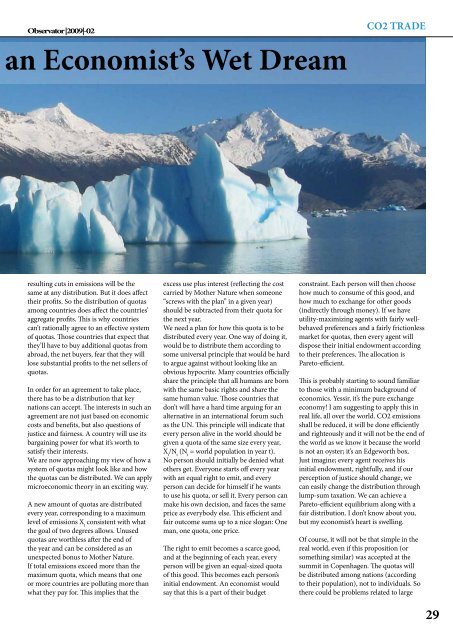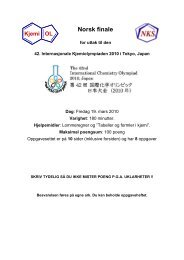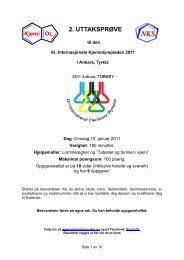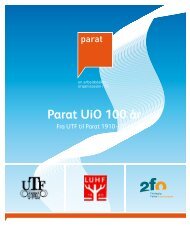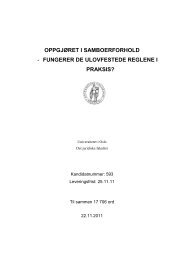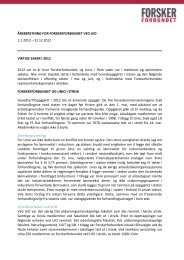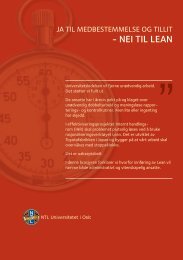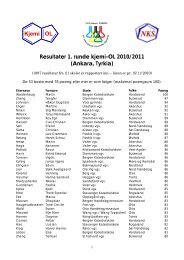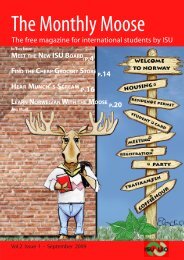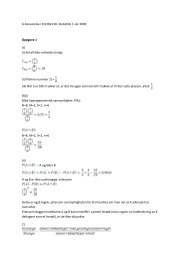2009:2 - Universitetet i Oslo
2009:2 - Universitetet i Oslo
2009:2 - Universitetet i Oslo
- No tags were found...
You also want an ePaper? Increase the reach of your titles
YUMPU automatically turns print PDFs into web optimized ePapers that Google loves.
Observator |<strong>2009</strong>|-02CO2 TRADEan Economist’s Wet Dreamresulting cuts in emissions will be thesame at any distribution. But it does affecttheir profits. So the distribution of quotasamong countries does affect the countries’aggregate profits. This is why countriescan’t rationally agree to an effective systemof quotas. Those countries that expect thatthey’ll have to buy additional quotas fromabroad, the net buyers, fear that they willlose substantial profits to the net sellers ofquotas.In order for an agreement to take place,there has to be a distribution that keynations can accept. The interests in such anagreement are not just based on economiccosts and benefits, but also questions ofjustice and fairness. A country will use itsbargaining power for what it’s worth tosatisfy their interests.We are now approaching my view of how asystem of quotas might look like and howthe quotas can be distributed. We can applymicroeconomic theory in an exciting way.A new amount of quotas are distributedevery year, corresponding to a maximumlevel of emissions X tconsistent with whatthe goal of two degrees allows. Unusedquotas are worthless after the end ofthe year and can be considered as anunexpected bonus to Mother Nature.If total emissions exceed more than themaximum quota, which means that oneor more countries are polluting more thanwhat they pay for. This implies that theexcess use plus interest (reflecting the costcarried by Mother Nature when someone“screws with the plan” in a given year)should be subtracted from their quota forthe next year.We need a plan for how this quota is to bedistributed every year. One way of doing it,would be to distribute them according tosome universal principle that would be hardto argue against without looking like anobvious hypocrite. Many countries officiallyshare the principle that all humans are bornwith the same basic rights and share thesame human value. Those countries thatdon’t will have a hard time arguing for analternative in an international forum suchas the UN. This principle will indicate thatevery person alive in the world should begiven a quota of the same size every year,X t/N t(N t= world population in year t).No person should initially be denied whatothers get. Everyone starts off every yearwith an equal right to emit, and everyperson can decide for himself if he wantsto use his quota, or sell it. Every person canmake his own decision, and faces the sameprice as everybody else. This efficient andfair outcome sums up to a nice slogan: Oneman, one quota, one price.The right to emit becomes a scarce good,and at the beginning of each year, everyperson will be given an equal-sized quotaof this good. This becomes each person’sinitial endowment. An economist wouldsay that this is a part of their budgetconstraint. Each person will then choosehow much to consume of this good, andhow much to exchange for other goods(indirectly through money). If we haveutility-maximizing agents with fairly wellbehavedpreferences and a fairly frictionlessmarket for quotas, then every agent willdispose their initial endowment accordingto their preferences. The allocation isPareto-efficient.This is probably starting to sound familiarto those with a minimum background ofeconomics. Yessir, it’s the pure exchangeeconomy! I am suggesting to apply this inreal life, all over the world. CO2 emissionsshall be reduced, it will be done efficientlyand righteously and it will not be the end ofthe world as we know it because the worldis not an oyster; it’s an Edgeworth box.Just imagine; every agent receives hisinitial endowment, rightfully, and if ourperception of justice should change, wecan easily change the distribution throughlump-sum taxation. We can achieve aPareto-efficient equilibrium along with afair distribution. I don’t know about you,but my economist’s heart is swelling.Of course, it will not be that simple in thereal world, even if this proposition (orsomething similar) was accepted at thesummit in Copenhagen. The quotas willbe distributed among nations (accordingto their population), not to individuals. Sothere could be problems related to large29


